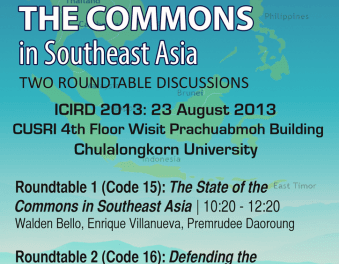With banners reading "Hands off Our Maize" and "Stop the Transgenic Conquest," activists from Greenpeace protested yesterday at the Cuautemoc Monumnet at the Paseo de la Reforma, demanding that the Mexican government stop the import of transgenic corn varieties from the United States.
The action, in which members of the organizations Via Campesina and Focus on the Global South participated, was the opening act of a series of activities being prepared by Greenpeace and organizations of peasants and indigenous peoples to show their rejection of the ministerial meeting of the World Trade Organization that will take place in Cancun from September 10 to 14.
Speaking on behalf of peasant and indigenous organizations, Walden Bello, executive director of Focus on the Global South, and Gilma Benitez of the Colombian chapter of Via Campesina articulated the demands for "food sovereignty" for the peoples of Latin America and an end to the dumping of genetically modified seeds.
"The contamination of local maize with transgenic seeds is a serious environmental disaster. The biotechnological firms are doing everything to manipulate governments throughout the world, including those in Asia. This is the height of biological imperialism," Bello warned.
Greenpeace deplored the fact that nearly two years after the discovery that Mexican maize was contaminated, the Secretary of Agriculture had taken no measures to stop the entry of transgenic grain and had even concealed the results of the testing of 500 grain samples taken from contaminated zones as well as the identity of the firm involved.
The culprit is Monsanto, which later admitted ownership of the Mexican grains that had been genetically modified, according to Liza Covantes, coordinator of the Campaign against Genetic Engineering of Greenpeace Mexico, who pointed to a host of economic and legal issues stemming from genetic contamination.
"What will happen to peasants whose grain is contaminated by genetically modified seeds? Will they be brought to court by firms like Monsanto on charges of theft of genetically modified seeds? Let us not forget that that transnational corporation produces 97 per cent of the transgenic seeds distributed throughout the world. This has worsened the already delicate state of the Mexican countryside."
For its part, Greenpeace asked the government to immediately halt the importation of transgenic maize, using the Cartagena Protocol, which recognizes the right of countries to stop the entry of genetically modified organisms into their territories if these posed a threat to biodiversity and public health.
Greenpeace demanded as well that measures be taken to prevent the countryside from succumbing to the pressure of corporations that seek the control of seeds critical to global food security.








